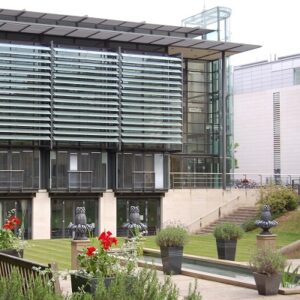Studying abroad at Hertford College, Oxford University from January 2024 until June 2024 was truly an introspective and invaluable experience. From solo traveling to Vienna, Austria to reading and writing in the numerous magical libraries, I was able to use my time freely to develop myself and deeply pursue my intellectual interests. In particular, during my Trinity Term, which ran from April to June, I enrolled in tutorials (one-on-one discussions with tutors, who are professors and scholars that are pioneering experts in the respective field of interest) in Korean literature and Japanese literature. As a College of East Asian Studies (CEAS) major back at Wesleyan who was interested in writing a senior honors thesis, I had an inkling about what I wanted to do, so I took the tutorials as an early opportunity to explore tangential theories and intriguing scholarship.
Studying abroad at Hertford College, Oxford University from January 2024 until June 2024 was truly an introspective and invaluable experience. From solo traveling to Vienna, Austria to reading and writing in the numerous magical libraries, I was able to use my time freely to develop myself and deeply pursue my intellectual interests. In particular, during my Trinity Term, which ran from April to June, I enrolled in tutorials (one-on-one discussions with tutors, who are professors and scholars who are pioneering experts in the respective field of interest) in Korean literature and Japanese literature. As a College of East Asian Studies (CEAS) major back at Wesleyan who was interested in writing a senior honors thesis, I had an inkling about what I wanted to do, so I took the tutorials as an early opportunity to explore tangential theories and intriguing scholarship.

Hertford College’s Bridge of Sighs
As a member of the college, I had the special privilege of crossing the bridge to attend my tutorials.
Fortunately, my tutors were invested in helping me develop the skill set and a preliminary reading list for my thesis. Although my preliminary thesis readings were not the focal point of discussion during my tutorials, I took the initiative to connect back to my interests in women’s speculative fiction during these discussions.
Outside of tutorials, I had all the time to explore beyond the readings on my reading list. I took the liberty of taking advantage of Oxford’s library database to investigate various scholars and histories that piqued my interest.
The different libraries I studied at and worked in:






If they happened to be loosely related to my thesis, that was a win. However, even if the papers were not related, I became engrossed in these novel theories and discussions. Specifically, the conversations with my tutors about how Korean society is reflected in contemporary women writers’ stories as well as the notion of “proper” literature in highbrow literary circles were topics not directly related to my prospective thesis, but greatly helped me develop the thinking to approach my research from a flexible, interdisciplinary perspective. Eventually, after having gained foundational knowledge in the history of speculative fiction in Korea and Japan, as well as gaining an overview of queer and psychoanalytic theorists, and the relevant literature, I left Oxford feeling both anxious and invigorated.
Main Takeaways from Tutorials:
1. Translations make narratives acessible but also obscure certain voices and nuances.
2. Being able to both defend your argument and being open-minded to new perspectives is powerful.
3. The translation of nation's literary canons influences the transnational perceptions of a nation's culture.
Alongside these one-on-one tutorials, I pursued my intellectual interests beyond the classroom and sometimes even beyond Oxford. I took the time to seek out author events that were not required of me at all. I attended an event that was hosting Murata Sayaka, a Japanese women’s writer dealing with narratives about women’s bodies, sexuality, and futurity—listening to the author whose stories I would be analyzing in my thesis was an empowering and exciting experience. I was able to attach a real voice to the narrator of the stories I had been silently reading and poring over. Likewise, I traveled to Cambridge University by myself to listen to Min Jin Lee discuss her journey as Korean American women and her experiences interviewing diasporic Koreans and scholars for research to write her novels. Once again, having the opportunity to listen to Min Jin Lee was inspiring and revitalizing. By pursuing my interests both inside and outside the classroom, I was truly able to learn that I indeed have a passion for East Asian women’s literature. Armed with such invaluable knowledge and experiences, I now embark on writing my senior thesis.
